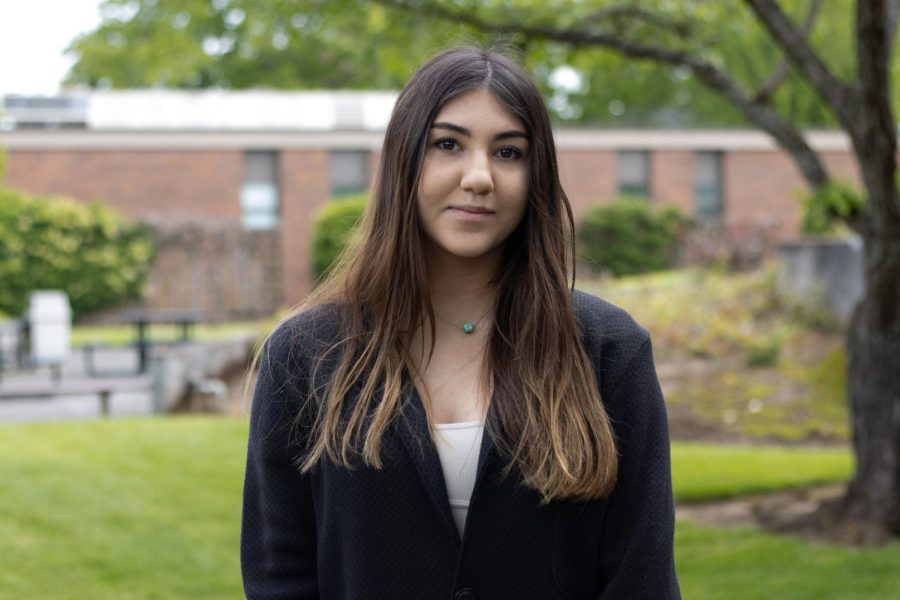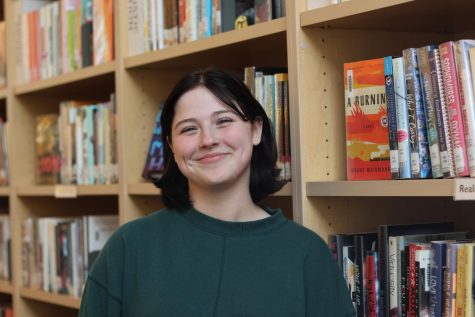Russian Transfer Student Lisa Safina Opens Up About Her Experiences Amid War in Ukraine
“Everything started going better,” sophomore Lisa Safina said. “And then the war started.”
May 25, 2022
When sophomore Lisa Safina moved from Russia to the United States in September, it was a long-time dream come true. However, Russia’s attack on Ukraine in February and the subsequent war that has since persisted in the region would soon make things much more complicated for her.
After living and studying in various countries across Europe and Asia, including Russia and Thailand, Safina and her parents finally decided on sending her to school in the U.S., where she began her sophomore year at La Salle in the fall. Instead of her typical time of a few months or years in a new place, Safina hopes to stay in the U.S. for a long time.
“I was just dreaming about this all the time I was in Russia,” Safina said.
Despite her original enthusiasm, moving to and attending school on an entirely different continent proved difficult for Safina. On top of the time and money that her family spent getting her here, adjusting to the people, language, customs, and her life away from her friends and family were initially some of the most challenging facets of moving to the U.S.
The first four months were “like a hell,” Safina said, remembering the feeling of depression she had during this time.
“I was going to school, I was calling my parents after that, we were talking, and then, at night, I was just crying [into] my pillow,” Safina said. “Because I was like, ‘I can’t do both.’”
Making friends and connecting with others was an arduous task for Safina as a result of the major differences in how people — especially teenagers — act in the U.S. in terms of their mannerisms, sense of humor, and worldviews compared to those in the other places she has lived throughout her life, so she found herself without many friends for the few first months of her time in the U.S.
“I didn’t know anything about this country,” Safina said. “I didn’t know anything about [the] people.”
Although it was hard for her at first, Safina has come to understand her hardships from the time of her initial move to the U.S. in a more positive light.
“I was thinking about moving back to Russia,” Safina said. “But then I was like, ‘These troubles [and] problems are making me stronger.’ And it was my dream to move here, so basically I was like, ‘I can’t just miss this. I know not everyone can have this chance to move here, so I can’t stop.’”
But her dream would soon turn into a nightmare when Russia announced its invasion of Ukraine earlier this year.
“Everything started going better,” Safina said. “And then the war started.”
Since she moved, Safina has been staying with her grandparents, who have lived in the U.S. for around 20 years. Meanwhile, her parents, who are both Ukrainian, have continued to travel across Europe — something Safina said she was initially excited about, calling living away from her parents the “dream of every teenager.” But being without her parents, who she considers two of her best friends, became increasingly difficult following the beginning of the war.
“The first thoughts that I had at the time, I was like, ‘So I’m not going to meet my parents,’” Safina said. “It actually sounds kind of selfish because I was thinking about myself at that moment, but I was like, ‘I’m not going to meet my parents this year. When am I going to be [with] my parents?’”
With extended family living in both Russia and Ukraine, Safina has had first-hand experience with the complexities of the war abroad — the spread of propaganda in Russia and the enactment of sanctions from the U.S. causing tensions between Safina and the Russian and Ukrainian sides of her family.
Since the beginning of Russia’s invasion of Ukraine, the Russian government has been firmly regulating Russian media and has even gone as far as to make missteps on this front a criminal offense. In doing this, Russia’s government has been able to control much of what Russian citizens are seeing and how they are perceiving the war in Ukraine as well as Russia’s role in it.
Safina’s friends and family in Russia were no exception to this, as many of them had initially been led to believe that the invasion of Ukraine was fake, Safina said, or that it was a mission meant to save Ukraine.
“But how [can you] save Ukraine when you’re killing innocent people?” Safina said.
Safina’s frustration with the distorted perception she was hearing from her friends in Russia has persisted alongside the war, and she said her annoyance with them has gotten to the point where she doesn’t want to speak to them anymore so long as they do not acknowledge the truths of the matter.
“It looks like they have… rainbow sunglasses,” Safina said. “And they just see everything in rainbow and then everything’s good. But please take them off just for one second. Just please look at what’s going on right now in the world.”
As a result of the brutality from Russia toward Ukraine, the U.S. and many other nations have joined in placing sanctions on Russia, targeting Russian oligarchs, those close to President Putin, as well as Putin himself, and subsequently making daily life slightly more difficult for Russian civilians as well. With many international companies having withdrawn from trading with or continuing operations in Russia, and the U.S. and its allies placing restrictions on Russian international banking and imports and exports, Russian citizens have consequently been impacted by these direct hits to the Russian economy.
For Safina, the sanctions enacted on Russia have prompted mixed feelings, as she said that, despite feeling bad for her family still living in Russia, she views the sanctions placed on the country as a mostly positive and justifiable development resulting from the war.
“It’s their turn to suffer,” Safina said. “Dying because somebody’s attacking you — killing you — is not the same thing [as not having] toilet paper right now in your country. You can live without it.”
Sanctions not only affected Safina’s extended family in Russia, but they also directly affected her and her parents traveling outside of Russia. Now unable to continue to receive money from her parents abroad due to the sanctions, Safina was forced to find a job and support herself financially.
“My parents told me that they’re not going to be able to send me money anymore, and I didn’t know what to do with [that],” Safina said. “So that day I was like, ‘Okay, I’m working.’”
As for Safina’s relation to Russia — having been born there and living there on and off throughout her life — she identifies as Ukrainian more so than she does Russian due to her perception of not having lived there for a long enough time. “I’m from Russia,” Safina said. “But in truth, I’m Ukrainian… I was always traveling around the world. I was just staying in Russia for like three months, six months, or a year.” Yet, Safina feels that assumptions are still made about her based on her place of birth and, thus, her opinions surrounding the war.
From both her friends in Russia and people in the U.S., Safina has been faced with unending questions about her thoughts on the war and of her loyalty to either Russia or Ukraine — questions she said she has become increasingly tired of.
“I’m not on somebody’s side,” Safina said. “I have family in Russia, and I have family in Ukraine… Family is the most important thing in your life.”
Safina hoped that school would serve as an escape from constantly hearing of the war in Ukraine. Instead, it became a constant reminder of it when the war first started, with further questioning and attempted support by way of checking up on Safina and praying for Ukraine from students and staff at La Salle becoming both a source of consolation and frustration.
“[People from school] they’re like, ‘How [do] you feel? Are you okay? How’s your family?’” Safina said. “And from one side, I was really glad. But at the same moment, I was just like, ‘I don’t want to talk about this.’”
And despite the support she has received, Safina and her family initially feared that she would be treated differently or hated by students and teachers at La Salle for being from Russia when the war started. “I was just so scared that people [would] turn their backs on me,” Safina said. Her father advised her not to tell people she was Russian as her family recognized the negative preconceived notions surrounding Russia and its people following the invasion.
“The war started, and I was just like ‘Okay, I’m going to lose everybody right now, again — I’m not going to have anybody again,” Safina said.
Instead, Safina found that her experience at La Salle differed greatly from her and her family’s expectations of how she would be treated when news of the war in Ukraine reached the U.S.
“People here understood it,” Safina said. “They told me that I don’t have to feel bad about the situation because they will always stand by my side.”
In recent months, things have been looking up for Safina and her family, she said. Her parents, who Safina hasn’t seen in person for months, have acquired visas and are currently working on coming to the U.S. to visit her, and her uncles, who attempted to flee from Ukraine when the war began but were stopped by police, successfully made it out and are safe.
“Oh my god,” Safina said. “I’m so happy.”
Still, the war in Ukraine is not over, and although Safina and her family are safe, she recognizes the continuous effects that war has and will have on those involved. Safina has attended many Victory Day celebrations that are held every year on May 9 in Russia and, thus, has been a direct witness to the impact that World War II continues to have on Russian veterans. She said that she remembers the sadness and emptiness in their faces during these celebrations, and she fears for the ways in which this war in Ukraine will have effects lasting much longer than the war itself.
“Of course, I want this to end,” Safina said. “But it’s really, really hard to just end this war… because, after war, nobody is the same as they were.”







Tom McLaughlin • May 26, 2022 at 3:28 pm
Well written, Lillian. You did a good job of weaving Lisa’s voice with your reporting of some of what is happening in Ukraine and Russia. And Lisa, I’m so glad you’re here. You make us a stronger community, a better and more diverse family. Thank you.